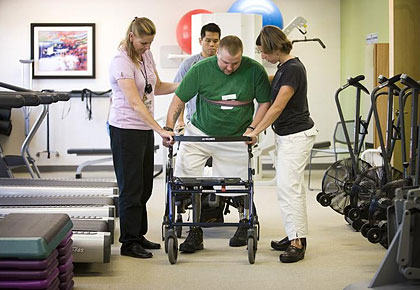 When someone sustains a spinal cord injury following an auto collision, a stumble over a jutting rock, or an act of violence, they are entitled to seek compensation from the author of their misfortune. However, the process of filing a claim can be complicated and taxing to the lay person who, let us hope, does not deal with it on a regular basis. Insurance companies are designed to take advantage of small errors in an effort to deny the validity or timeliness of a claim. The roadblocks encountered in the process of filing for compensation can feel like a second blow in itself.
When someone sustains a spinal cord injury following an auto collision, a stumble over a jutting rock, or an act of violence, they are entitled to seek compensation from the author of their misfortune. However, the process of filing a claim can be complicated and taxing to the lay person who, let us hope, does not deal with it on a regular basis. Insurance companies are designed to take advantage of small errors in an effort to deny the validity or timeliness of a claim. The roadblocks encountered in the process of filing for compensation can feel like a second blow in itself.
As always, forewarned is forearmed. It is best to know soon what actions at or near the accident can make things easier in the future—and thus, the reason for this article. In all personal injury cases, it must be proven that there was a duty to protect the vicinity, that the conditions leading up to the accident were caused by negligence, and that they were a proximate cause of the injury. To find out how this applies to spinal cord injuries, read on.
1. Proof that the entity against whom the claim is filed had a responsibility to take certain precautions.
The operators of a business, premises, or other area open to members of the public have a duty to ensure that those who enter therein are secure from whatever hazards they can reasonably be expected to anticipate and prevent. Whether the people entering the area are customers, patrons, employees, or anyone legally permitted on the property, they have a right to assume that no harm will befall them as they shop, study, or tread across the grounds.
It is important, when filing a claim, to determine correctly who is answerable for injuries occurring on the premises. In many cases, there are several culpable parties—the owner of a store, the proprietor of the building, or a fellow citizen behaving recklessly. If you are in a rut, a personal injury attorney can help track down the powers that be.
2. Proof that the entity in question reneged on their responsibility.
This may not be as difficult as it sounds: Forty percent of spinal cord injuries result from motor vehicle accidents, which often have several witnesses and almost invariably leave dramatic evidence when they are serious enough to have caused a spinal cord injury. The second most common causes, slip/fall accidents, also frequently happen on scenes with photographable evidence—a wet floor, a protruding board, etc. It is the victim’s job (insofar as they are able) to determine a timeline, formulate an accurate narrative to the best of their ability, and establish that the hazard could have been prevented with moderate foresight.
3. Proof that the accident was the result of their negligence.
One means used to prevent spinal cord accident victims from claiming remuneration is to assert that the hazard could not have been enough to cause such an injury. While an actual forensic investigation into the possibility is unlikely (most personal injury cases settle out of court), this is a place where witness statements—and, not improbably, the clout lent by an attorney—come in handy.
4. Proof that the injury resulted from that accident
To prove that a spinal cord injury took place as a direct result of the accident, rather than the culmination of a number of preexisting conditions is somewhat more difficult. The opinion of a medical professional (or multiple medical professionals) is a great start; but insurance companies employ their own doctors to posit that the injury had other roots. Here, the help of a personal injury attorney can be especially valuable, should you run into a dispute.
If you are currently struggling to make ends meet after a spinal cord accident, and it seems that the cards are stacked against you, don’t prolong your adversity any further—for a fair contingency fee, Good Guys Injury Law can represent you in extenuating circumstances. For a free initial consultation to determine that their services would be worth your while, call (801) 506-0800.
Image Courtesy of Military Connection